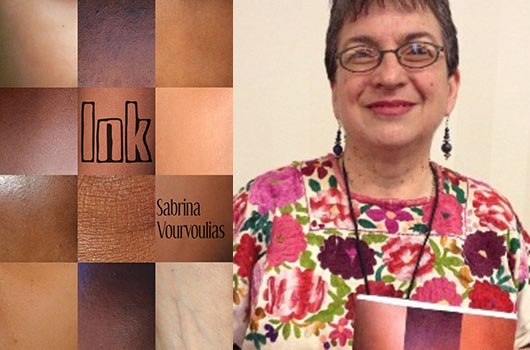
For more than 13 years, Sabrina Vourvoulias has been tirelessly covering immigration issues from every possible genre and angle. She started as a journalist tracking migrant workers in upstate New York. Now she is the managing editor of Al día newspaper in Pennsylvania and recently wrote Ink, her first novel. She also is the blogger behind Following the Lede.
“Immigration advocacy is very important in my life,” says Vourvoulias. “The human component gets lost in the immigration discourse. We are all brothers and sisters. We have the same set of dreams and aspirations, flesh and blood.”
The last name Vourvoulias is not very common for a Latina. When I asked her where it came from, she explained that her father’s family was Greek and that he was a first generation American who grew up in Colombia and Mexico. The question of roots, sense of community and immigration runs deep in her blood and shines throughout her work as a journalist, advocacy blogger and fiction writer. “As a young woman I always thought my greatest strength was creativity, but now I’d say it’s endurance,” says Vourvoulias. “I don’t let hope die.”
AN IMMIGRANT IN THE RURAL U.S.
Named in honor of an Audrey Hepburn movie, Sabrina Vourvoulias was born in Thailand and raised in Guatemala. The country became both inspiration for her as a journalist and a source of tremendous sadness. She was forced to come to the U.S. as a teenager when her family fled Guatemala’s undeclared civil war that raged during most of the last part of the 20th century.
Though bilingual and a U.S. citizen, Vourvoulias still faced the struggles that are common in building a life in a new country. “It was really difficult, a huge amount of culture shock.” Her family landed in rural Pennsylvania and she and her siblings were the first foreign students at their school. “They didn’t know how to assess us,” she recalls.
Vourvoulias says that while she is ashamed of speaking only two languages, she is truly appreciative of the life she has built as a professional woman, wife and mother in the U.S. “I have had a lot more opportunities and latitude to make mistakes, latitude to try out a lot of different avenues that I’m not entirely sure I’d have been able in Guatemala.”
Read Related: 7 Questions for Adriana Páramo: Author of ‘Looking for Esperanza’
FOLLOWING THE LEDE
In her blog, she covers first person accounts of undocumented workers and their struggles. But she decided that fiction was the best avenue for her to face what she describes as a growing anti-immigrant and Latino discourse that is no longer centered on documentation. “The complaints you hear are far more cultural, frequently they suggest a dominant culture that doesn’t like the influx of another culture.”
Her interest in fiction as a tool to process collective memory goes back to the strong indigenous traditions in Guatemala and her college years at Sarah Lawrence University as a creative writing and film major. In her novel, Ink, four different voices describe a complicated near-future where immigrants are forced to have a biometric tattoo. Fantasy, myth and journalism play a big role. “Nothing in the book offers any sort of panacea,” she says. “Magic might help you get through things but doesn’t change the situation. The only thing that never fails is the ability of human beings to love one and other.”
As a Latin woman of multiple talents and powerful dedication, she attributes her strength to family and faith. As an American writer and advocate tackling difficult and sensitive subjects, she advises, “Nobody gets to define you but you, and as long as you are willing to keep trying, your definition of you changes and grows.”
Follow her on Twitter @followthelede.










